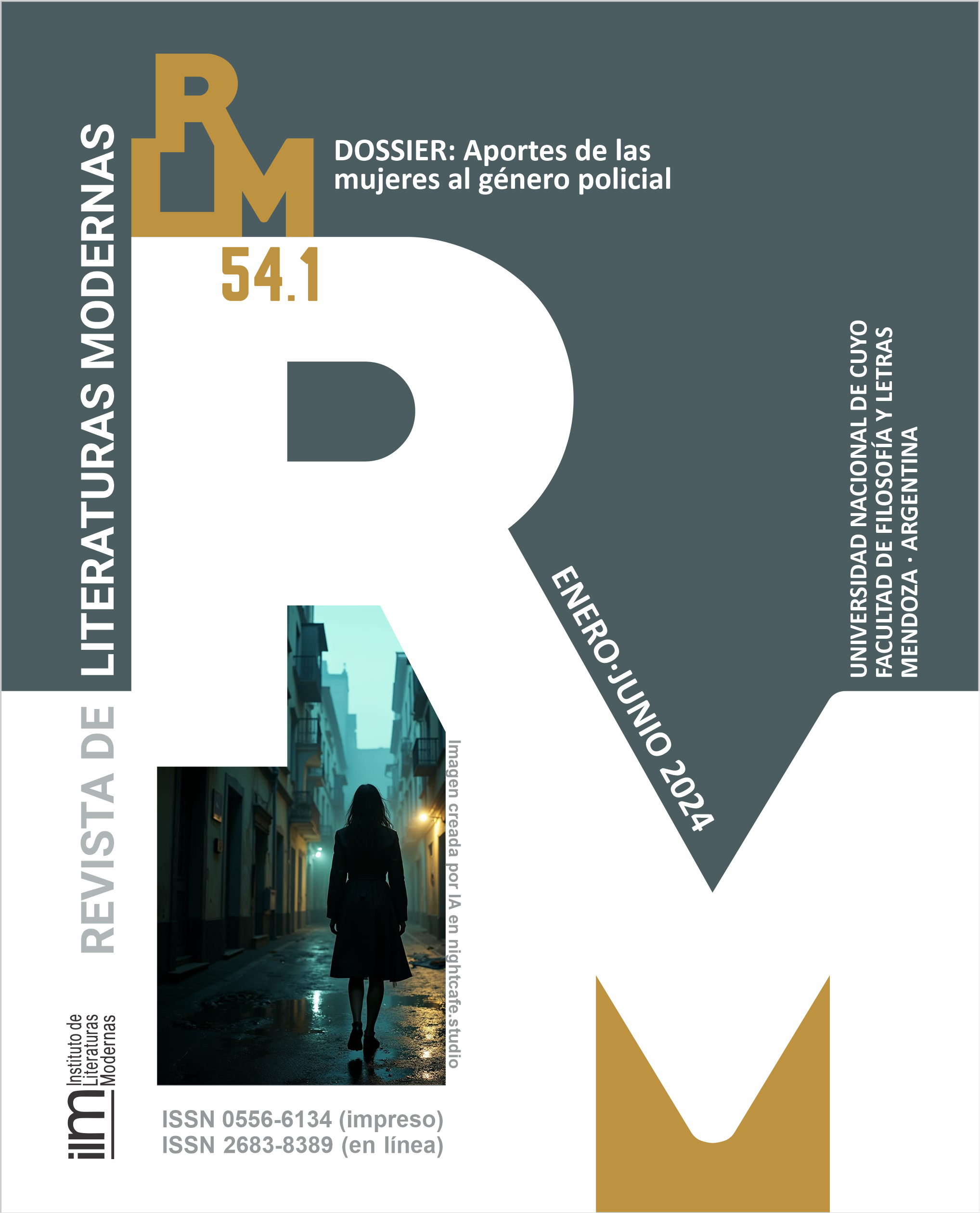Two approaches to innovate in feminist crime novels
Keywords:
crime, detective, female writers, literary innovation, historical novelAbstract
The canon of detective novels in increasing quantity and quality constitutes a kind of seismograph that detects the movements of human passions and the profound transformations of society. Gender constitutes an aesthetic category that allows a better understanding of reality. The novels of Batya Gur and Mercedes Giuffré stand out for being an investigation of identity that tries to understand the changing being of a nation.
Identity is a reality that flows and always challenges in different areas: personal, institutional, family, therefore, the inhabitants of a country. Additionally, there are many ways to approach it: from philosophy, sociology, psychology... Who are we? Where do we come from? Where do we go? They are unavoidable questions for human beings that are not apathetic for them. Literature offers a somewhat holistic and always aesthetic inquiry into this search. Gur and Giuffré fall into this category by presenting innovative and engaging novels.
The innovation in the way these writers portray the genre is given by an imagination taken to the limit to understand the identity of a nation. Along with the aesthetic pleasure of agile and careful styles, questions that invite reflection remain in the reader's memory. The investigation of identity is presented with open and suggestive views.
Downloads
References
Aguirre, O. (17 de diciembre de 2018). Adiós a la ‘femme fatale’: la hora de las mujeres detective en la literatura argentina. Infobae. https://www.infobae.com/cultura/2018/12/17/adios-a-la-femme-fatale-la-hora-de-las-mujeres-detective-en-la-literatura-argentina/
Alonso, P. y Santamaría, J. (2004). Antología del relato policial. Estudio preliminar. Vicens Vives.
Berg, N. (25 de junio de 2021). Batya Gur. Jewish Women's Archive. https://jwa.org/encyclopedia/article/gur-batya
Castellino, M. (septiembre de 2023). Las mujeres y la ficción policial: escritoras y detectives. (Ensayo de una tipología a la luz de ejemplos argentinos). En XV Jornadas interdisciplinares de Estudios sobre las mujeres. Universidad Nacional de Cuyo, Mendoza, Argentina.
Del Campo, C. (2021). Tierra ardiente. Plaza&Janes.
En voz alta Tv. (26 de diciembre de 2017). En Voz Alta | Mercedes Giuffré Bloque 1 [Video]. YouTube. https://youtu.be/R0O19ZA7z7g?si=ETeN7XjdKJkYhLUH
Gamerro C. (13 de agosto de 2005). Decálogo del relato policial argentino. Revista Ñ. https://www.narrativas.com.ar/decalogo-del-relato-policial-argentino/
Giuffré, M. (2004). En busca de una identidad. La novela histórica en Argentina. Ediciones del Signo.
Giuffré, M. (2008). Deuda de Sangre. Suma de Letras.
Giuffré, M. (2010). El peso de la verdad. Suma de Letras.
Giuffré, M. (2011). El carro de la muerte. Suma de Letras.
Giuffré, M. (2017). Almas en pena. Suma de Letras.
Giuffré, M. (2023). La Asonada. Vestales.
Gur, B. (1994). Un asesinato literario: Un caso crítico (Trad. M. Corniero). Siruela.
Gur, B. (1998). El asesinato del sábado por la mañana. Un caso psicoanalítico (Trad. M. Corniero). Siruela. (Original publicado en 1989).
Gur, B. (2000). Asesinato en el Kibbutz: Un caso comunitario (Trad. M. Corniero). Siruela.
Gur, B. (2001). Un asesinato musical: Un caso barroco (Trad. M. Corniero). Siruela.
Gur, B. (2003) Asesinato en el corazón de Jerusalén: Un caso pasional (Trad. R. García Lozano). Siruela.
Gur, B. (2007) Asesinato en directo: Un caso en televisión (Trads. A. M. Bejarano, A. Klaus y E. Martín Ortega). Siruela.
Melana, M. y Mossello, F. (2014). El discurso policial. Reconfiguraciones del género en la sociedad contemporánea. Editorial Universitaria Villa María.
Moliner, M. (1996). La mujer y la literatura. Asparkia: Investigació feminista, 6, 189-192. https://www.researchgate.net/publication/39497099_La_mujer_y_la_literatura
Otheguy Riveira, H. (2021). Las novelas criminales de Batya Gur: oscuras pasiones en los más diversos ambientes. Culturamas. https://www.culturamas.es/2021/12/30/inteligencia-criminal-en-el-talento-literario-de-batya-gur/
Pérez Reverte, A. (2023). El problema final. Alfaguara.
Piñeiro, C. (2011). Betibú. Alfaguara.
Tacconi, M. C. (2014). Historiografía y ficción en nuevas novelas históricas argentinas. Universidad Nacional de Tucumán.
Treibel, G. (2024). Dignas de toda sospecha: las damas del crimen. Fondo de Cultura Económica. https://fce.com.ar/en-los-medios/dignas-de-toda-sospecha-las-damas-del-crimen-en-la-literatura/
Tzavta Usina Cultural. (9 de mayo de 2023). Batia Gur, El asesinato del sábado por la mañana [Video]. YouTube. https://youtu.be/4aEV2m65G1A?si=fE5Ywutx4JQdEBGL
Vivir de los cuentos. (22 de agosto de 2023). Un asesinato literario [Video]. YouTube. https://youtu.be/Ha3YccBR0As?si=tn8gatfZsii7Lf6o
Waleis, R. (2009). La huella del crimen. Adriana Hidalgo Editora.
Waleis, R. (2012). Clemencia. Adriana Hidalgo Editora.
Downloads
Published
How to Cite
Issue
Section
License

This work is licensed under a Creative Commons Attribution-NonCommercial-ShareAlike 4.0 International License.






